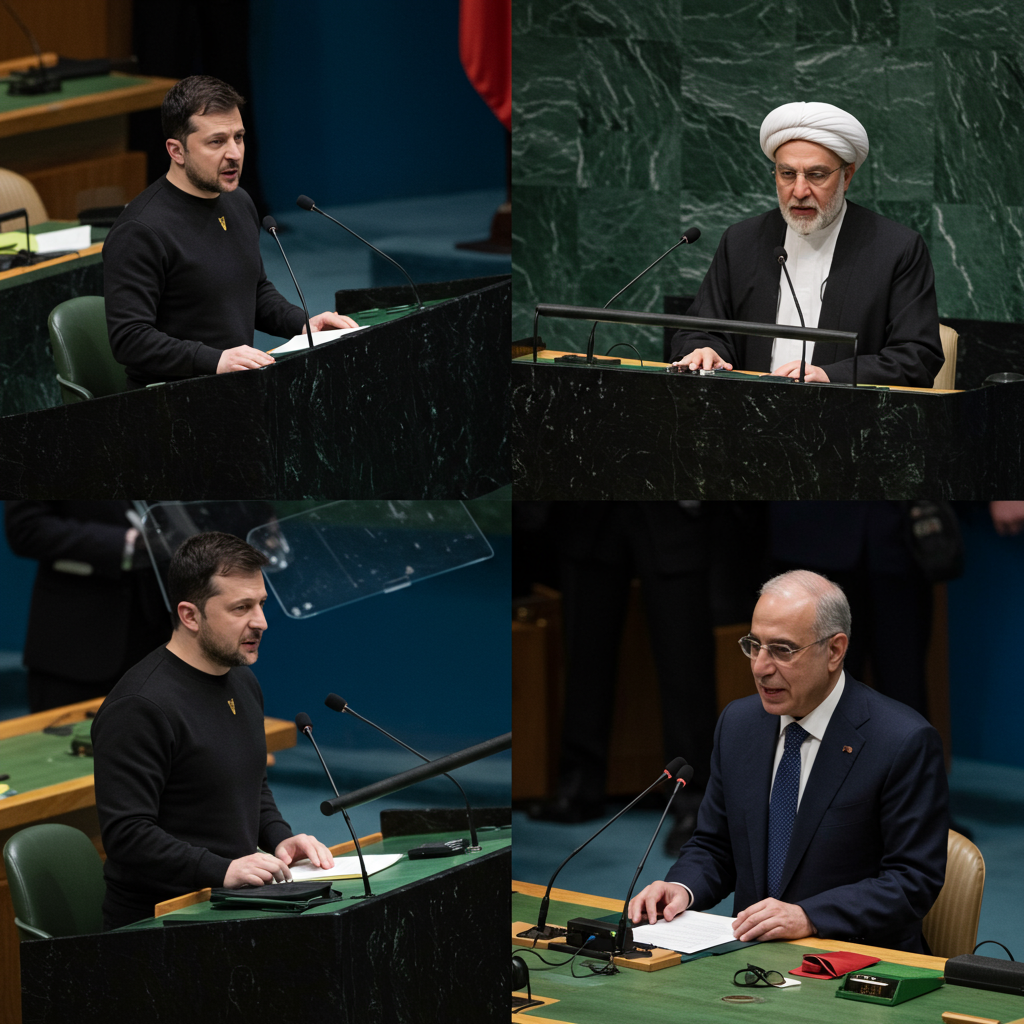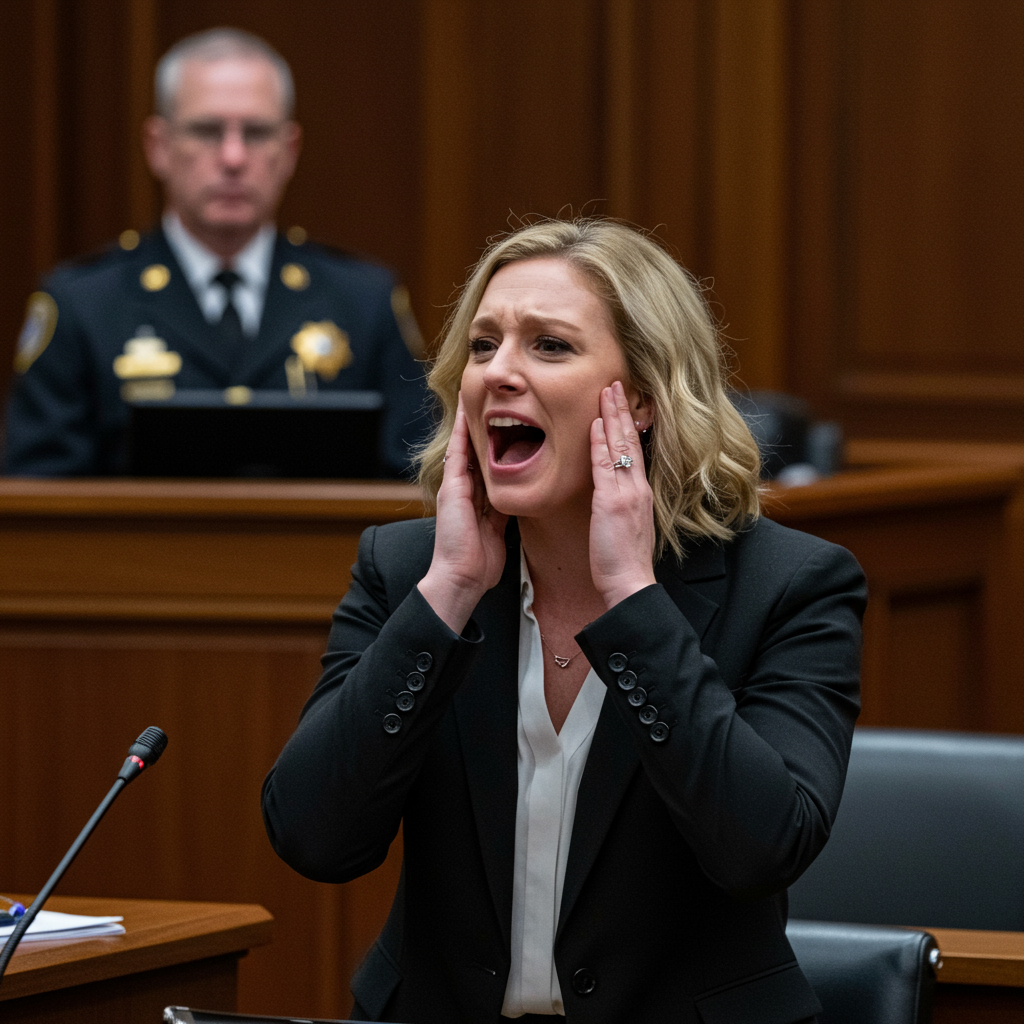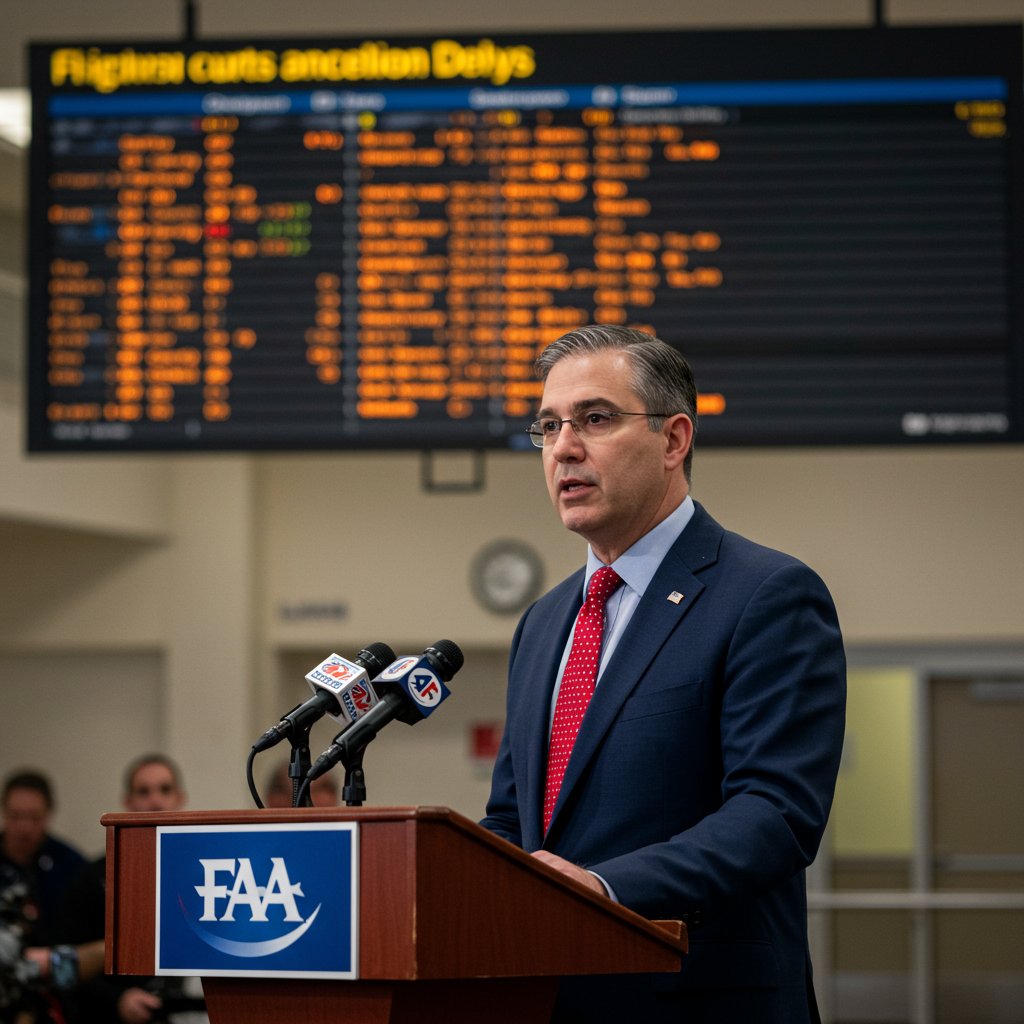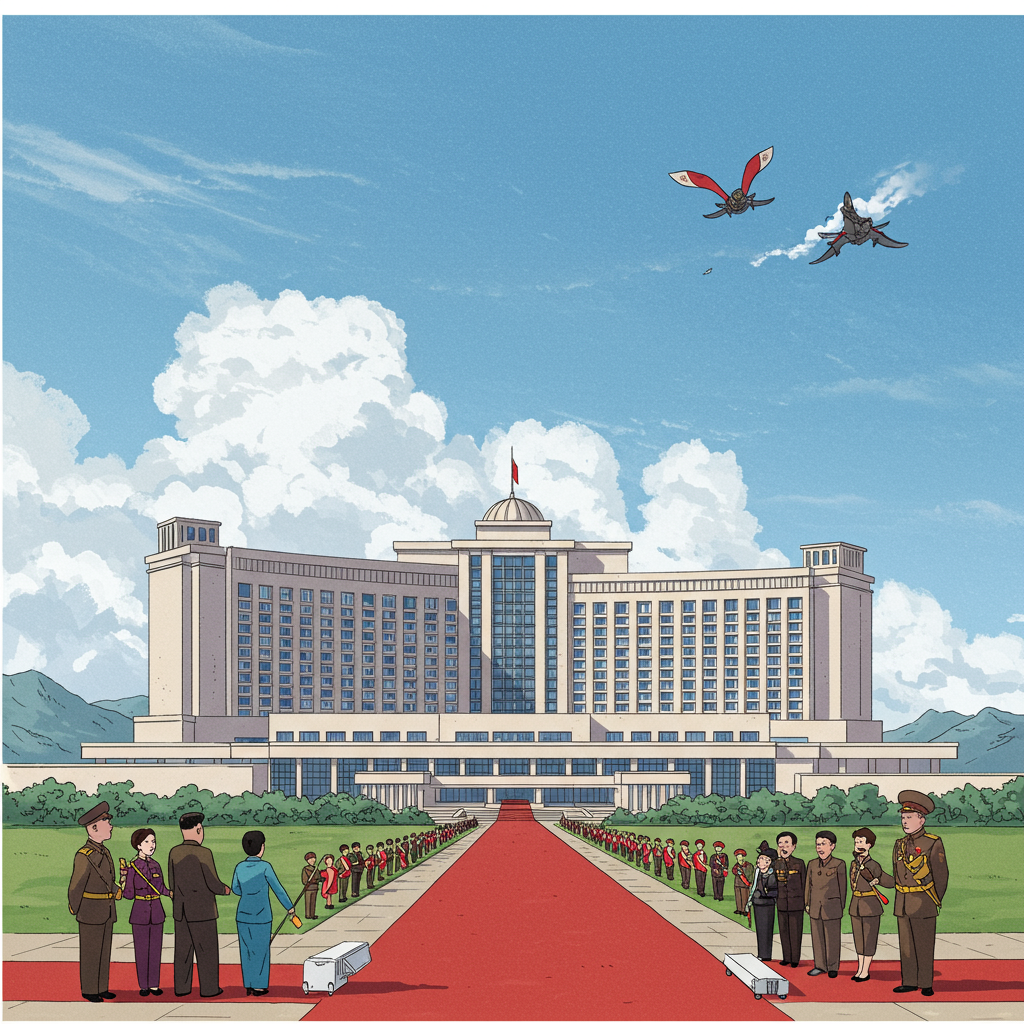The United Nations General Assembly recently became the epicenter of urgent global dialogue, featuring critical addresses from world leaders grappling with escalating conflicts, technological threats, and environmental imperatives. From impassioned pleas for military support to firm denials of nuclear ambitions and calls for rebuilding war-torn nations, the sessions underscored a world at a critical geopolitical juncture. Key figures like Ukraine’s President Zelensky, Iran’s President Pezeshkian, and Syria’s President al-Shara delivered speeches that set the tone for intense diplomatic negotiations and highlighted the complex challenges facing international cooperation.
Zelensky’s Urgent Appeal: Ukraine’s Fight and the New Arms Race
Ukrainian President Volodymyr Zelensky delivered a powerful and somber address, appealing passionately for increased military aid to counter Russia’s persistent aggression. He warned global leaders that Russian President Vladimir Putin’s expansionist agenda poses a threat far beyond Ukraine’s borders, stating, “Ukraine is only the first.” Zelensky stressed that “stopping him now is cheaper” than confronting a more aggressive Russia in the future. His speech came amidst heightened tensions following renewed backing for Kyiv by former U.S. President Donald Trump and alarming reports of Russian fighter jets and drones encroaching on NATO members’ airspace in Estonia, Poland, and Romania. Estonian President Alar Karis specifically cited a recent incursion by three Russian MiG-31 fighter jets as “another escalation,” reinforcing the urgency of Zelensky’s message.
A Call for Unwavering Support
Zelensky argued that the ongoing conflict in Ukraine is serving as a testing ground for “cutting-edge weapons.” He suggested it is in other nations’ self-interest to provide continued support, highlighting Ukraine’s strategic role in global security. His address followed a meeting with former President Trump, who signaled a significant shift in his view of the conflict. Trump declared his belief that Ukraine could “fight and WIN all of Ukraine back in its original form,” including its original borders, with robust support from the European Union and NATO. This marked a departure from earlier suggestions of potential land swaps. Despite acknowledging Russia’s “terrible” economy, Trump expressed pessimism for a swift end to the war, predicting it would “not end for a long time.” He also controversially suggested that NATO countries should shoot down Russian aircraft that violate their airspace.
The Looming Shadow of Evolving Warfare
Beyond the immediate conflict, Zelensky issued grave warnings about the world entering a “new era in military technology,” describing it as the “most destructive arms race in human history.” He specifically highlighted the unchecked rise of artificial intelligence (AI) and evolving drone capabilities, which he fears could one day allow terrorists or rogue states to deliver nuclear devices. These concerns were echoed by Security Council members and UN Secretary-General António Guterres, who has advocated for a global watchdog to oversee AI technology and establish governing rules. Trump also proposed an AI verification system to manage these emerging threats, underscoring a bipartisan concern regarding technological advancement.
Iran’s Defiant Posture: Nuclear Ambitions and Regional Tensions
Iranian President Masoud Pezeshkian spoke three months after a “12-day Israel-Iran war” that reportedly resulted in the assassination of many of Iran’s highest military and political leaders, and culminated in a U.S. strike on Iranian nuclear facilities. Pezeshkian vehemently portrayed Iran as a victim of military aggression, directing strong criticism towards what he described as Israeli and U.S. attacks in June. He asserted that these actions inflicted “a grievous blow upon international trust and the very prospect of peace in the region.”
Pezeshkian’s Stand Against Western Accusations
A central theme of Pezeshkian’s address was Iran’s nuclear activities. He explicitly denied any intention to develop nuclear weapons, declaring, “I hereby declare once before this assembly that Iran has never and will never seek to build a nuclear bomb.” This statement aligns with an earlier edict from Iran’s Supreme Leader, Ayatollah Ali Khamenei. Pezeshkian also strongly criticized Britain, Germany, and France (the E3) for their efforts to trigger the “snapback” mechanism to reinstate UN sanctions. He accused these countries of operating in “bad faith,” attempting to dictate Iranian compliance with a 2015 nuclear deal that the U.S. unilaterally abandoned. Furthermore, he linked Israel’s “12-day war in Iran” to its “two-year war in Gaza,” condemning Israeli aggression and envisioning a “radiant future” where powerful neighbors collectively oppose a “grand project that imposes genocide” on the region.
The Nuclear Standoff and Looming Sanctions
Pezeshkian’s appearance at the General Assembly came at a moment of intense diplomatic urgency for Iran. The nation faces the possibility of the UN reimposing sanctions if no breakthrough occurs in nuclear negotiations with Britain, France, and Germany by an impending deadline. The prospects for a diplomatic resolution were complicated by Supreme Leader Ali Khamenei, who had already rejected any direct nuclear talks with the United States prior to Pezeshkian’s arrival in New York. French President Emmanuel Macron issued a stern warning that Iran had “hours” to finalize a deal allowing international inspection of its nuclear programs or face new sanctions. Analysts suggested that Iran’s reliance on familiar talking points would likely prove insufficient to alter its international standing, signaling a need for a fresh approach in its foreign policy.
Syria’s Re-emergence: A New Chapter on the Global Stage
Syria’s interim President Ahmad al-Sharaa made a historic debut on the global stage, becoming the first Syrian leader to address the UN General Assembly since 1967. Al-Sharaa, a former Islamist fighter who led the rebel offensive that toppled the decades-long reign of the Assad family, presented his country as beginning a “new chapter of peace, prosperity and development.” He detailed the major steps his government has taken to rebuild the country and its institutions after sixty years of “deprivation, injustice, torture and chemical weapons” and a nation “torn apart” by civil war.
Al-Sharaa’s Vision for a Rebuilt Nation
Al-Sharaa called for the complete lifting of international sanctions to facilitate Syria’s rebuilding efforts and guarantee the rights of all citizens, promising “justice without vengeance” and accountability for the former regime. He also highlighted security threats from Israel, condemning recent Israeli airstrikes on Syrian territory and appealing for international condemnation and deterrence of further attacks, while reaffirming his support for Gaza. His speech sought to redefine Syria’s international image, signaling a desire for re-engagement and an end to decades of isolation.
Navigating Internal Promises and External Pressures
Domestically, while many Syrians expressed pride in their country’s return to the world stage, others voiced concerns about al-Sharaa’s promises of an inclusive government. Some feared that Islamist hardliner groups might hold the real power and that a lack of transparency could lead to a repetition of past abuses, underscoring the complexities of Syria’s path forward. His address marked a significant moment for a nation grappling with both the legacy of conflict and the immense task of national reconstruction.
Broader Global Agenda: From AI to Climate Change
Beyond these high-stakes geopolitical discussions, the General Assembly also served as a crucial platform for addressing other pervasive global challenges. Climate change, a consistent priority for UN Secretary-General António Guterres, received significant attention. Member states are set to present their national plans ahead of the COP30 climate conference in Brazil in November.
Accelerating Climate Action: China’s Commitments
A notable development was China’s announcement of unprecedented commitments. Chinese President Xi Jinping stated, “We have resolve and confidence to deliver on our commitments,” indicating that China appears to have met its 2030 climate targets well in advance. For the first time, China promised reductions in all its greenhouse gas emissions, targeting a 7 to 10 percent reduction by 2035 compared to “peak levels,” suggesting its emissions may have peaked this year. These pledges mark a significant step towards global climate action, although the implementation and verification remain critical.
Trump’s Broader Global Criticisms and Policy Views
Former President Trump used his address and subsequent bilateral meetings to offer sharp criticisms of European allies and the United Nations itself. He chastised European allies over immigration policies, famously stating, “Your countries are going to hell” due to “the failed experiment of open borders.” He advocated for restricting migration by “detaining and deporting everyone who crossed the border.” Trump also urged European nations to “immediately” cease all energy purchases from Russia.
Regarding the Middle East, Trump harshly criticized key Western allies for formally recognizing a Palestinian state, labeling it a “reward for these horrible atrocities.” He called for a united message demanding the immediate release of all remaining hostages held by Hamas. Despite questioning “What is the purpose of the United Nations?” in his speech, Trump later affirmed the U.S. is “behind the United Nations 100%,” acknowledging its “great potential for peace” during a meeting with Secretary-General Guterres. His policy points also included warnings to drug cartels, calls for an end to biological and nuclear weapons development, and advocacy for “free speech and free expression” and religious liberty.
Frequently Asked Questions
What were the main security concerns raised regarding military technology at the UN General Assembly?
President Zelensky of Ukraine raised significant alarms about the “most destructive arms race in human history,” fueled by the rapid advancement of artificial intelligence (AI) and drones. He warned of the potential for these evolving technologies to allow terrorists or rogue states to deliver nuclear devices, posing a grave threat to global security. UN Secretary-General António Guterres echoed these concerns, calling for a global watchdog to oversee AI technology and establish regulatory rules, a sentiment supported by former President Trump’s proposal for an AI verification system.
Which leaders made significant or historic addresses at the recent UN General Assembly?
Three leaders delivered particularly notable speeches:
- Volodymyr Zelensky (Ukraine): Made an impassioned plea for military aid, warned about Russia’s expansionist goals, and highlighted the dangers of advanced military technology like AI and drones.
- Masoud Pezeshkian (Iran): Firmly denied any intention to build nuclear weapons, portrayed Iran as a victim of aggression, and criticized Western powers over the 2015 nuclear deal and regional conflicts.
- Ahmed al-Shara (Syria): Became the first Syrian leader to address the Assembly since 1967, detailing his government’s rebuilding efforts and seeking to redefine Syria’s international image after decades of isolation and conflict.
What diplomatic pressures and deadlines is Iran currently facing regarding its nuclear program, as discussed at the UN General Assembly?
Iran is under intense diplomatic pressure, facing a looming deadline to reach a breakthrough in nuclear negotiations with Britain, France, and Germany. Failure to do so could result in the United Nations reimposing crippling sanctions. French President Emmanuel Macron explicitly warned Iran that it had “hours” to finalize a deal allowing international inspection of its nuclear programs. The situation is further complicated by Iran’s Supreme Leader, Ayatollah Ali Khamenei, who had already rejected direct nuclear talks with the United States prior to President Pezeshkian’s address, indicating a challenging path for diplomatic resolution.
Conclusion: A World at a Crossroads
The recent UN General Assembly served as a vital barometer for the state of global affairs, revealing a landscape defined by persistent conflicts, rapidly evolving technological challenges, and critical environmental decisions. The speeches from key leaders, particularly those from Ukraine, Iran, and Syria, highlighted the deep divisions and urgent issues that demand collective action. While the prospect of new sanctions for Iran looms, and the ongoing war in Ukraine continues to reshape international alliances, the discussions also revealed nascent efforts towards global cooperation on issues like AI regulation and climate change. The Assembly concluded with a clear message: the path forward for international diplomacy remains complex, requiring sustained engagement and innovative solutions to navigate an increasingly interconnected and volatile world.




